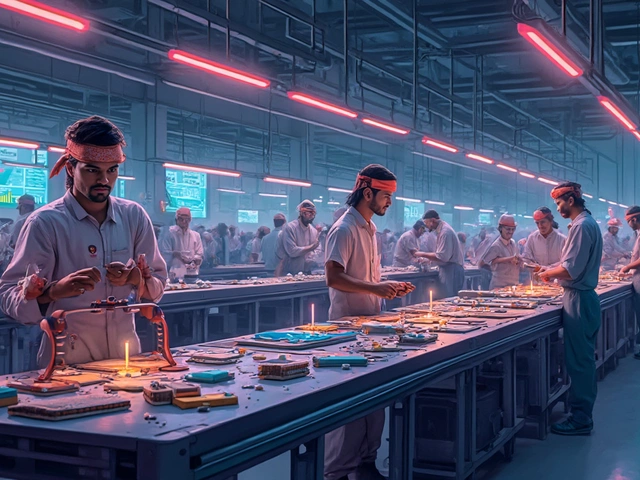Ever wondered which jobs in small scale manufacturing pay the most? If you're looking to climb the ladder in this industry, you've got to know where the money's at. Surprisingly, some roles offer hefty paychecks compared to others. Top earners usually hold jobs that require specialized skills or oversight responsibilities. Let's take a peek at a few standout positions.
Machine operators often find themselves in high demand. These roles require precision and focus since they deal with complex machinery that fabricates various products. If you know your way around a machine, you're in good shape to earn a decent living. And as manufacturing gets more tech-heavy, being tech-savvy can really pay off.
On the other hand, we've got quality control inspectors. These are the folks who ensure everything meets the required standards before products hit the market. Their keen eyes and attention to detail make them invaluable, and this is reflected in their salaries. This job offers a perfect mix of responsibility and reward.
- Top-Paying Jobs
- Skill Sets Needed
- Industry Demand
- Career Growth Opportunities
- Tips for Advancing
- Future Trends
Top-Paying Jobs
Small scale manufacturing has a bustling job market, especially if you know where the top dollar jobs are. The roles depend heavily on a blend of skill, experience, and sometimes a dash of technical know-how. Here’s a closer look at some of the best-paying gigs in the field.
1. Machine Operators
Machine operators stand tall in the manufacturing world. As companies rely on automated processes, these operators become crucial for keeping everything running smoothly. They work with sophisticated machinery that requires precision and a steady hand. The growing demand means they've got both job security and a healthy paycheck.
"Being a machine operator today is like being the linchpin of an orchestra, coordinating every element to produce a harmonic end product." - from the Manufacturing Association Annual Report
2. Quality Control Inspectors
Quality control inspectors are another group seeing some hefty earnings. They ensure the products meet all quality standards before heading out the door. In many cases, their word is the final say, making their role both critical and well-compensated. Companies are willing to pay to keep their products up to par.
3. Production Supervisors
If you've got strong leadership skills, consider a production supervisor role. These positions oversee entire production lines and ensure they operate without a hitch. The role involves managing teams, troubleshooting issues, and sometimes a bit of juggling to make deadlines. An eye for optimization can make a big difference.
| Job Role | Average Salary |
|---|---|
| Machine Operator | $45,000 - $60,000 annually |
| Quality Control Inspector | $50,000 - $65,000 annually |
| Production Supervisor | $60,000 - $80,000 annually |
These roles require a blend of hands-on skills and strategic thinking. If you're contemplating a shift or simply entering the workforce, these job paths in factory work might be just what you’re looking for.
Skill Sets Needed
When it comes to scoring a high-paying position in small scale manufacturing, the right skill set is everything. These aren't just any skills, but specific ones that enhance productivity and efficiency. Let's delve into what's needed.
Technical Proficiency
Knowing your way around machinery is crucial. Machine operators, for instance, need to understand the nuts and bolts of different equipment. This means being able to set up, adjust, and maintain machines with accuracy and confidence. Familiarity with digital controls is a plus, considering the tech upgrades in the industry.
Quality Assurance Expertise
For quality control inspectors, the devil is in the detail. A keen eye for spotting defects and ensuring compliance with standards can make or break a career in this role. Understanding quality metrics and using tools to measure them is essential. Think of yourself as a detective with a knack for maintaining top-notch product standards.
Problem Solving and Adaptability
These jobs often require quick thinking and adaptability. Equipment breaks down, supplies run late, and sometimes, things just don’t go as planned. Being able to troubleshoot issues swiftly can prevent costly downtime, making you a valuable asset to the team.
Teamwork and Communication
Though these sound generic, they're vital in a factory setting. Machines and processes are often interlinked, requiring operators to work closely with others. Effective communication ensures that everyone is on the same page, from setting production goals to executing them.
Learning Mindset
Industries evolve, and so do their technologies. Staying updated with the latest advancements, certifications, and training can significantly enhance your value. Some thriving high paying jobs demand that you continually develop your skills—being open to learning is an asset.
| Skill | Importance |
|---|---|
| Technical Proficiency | High |
| Quality Assurance | Medium |
| Problem Solving | High |
| Teamwork | Medium |
| Learning Mindset | High |
Industry Demand
Talking about demand, small scale manufacturing is an ever-growing field. It's not slowing down anytime soon, especially in these times when local production is gaining traction over imported goods. Consumers appreciate products that don't travel thousands of miles before reaching their doorstep.
One area seeing solid growth is sustainable and green manufacturing. Factories are focusing more on eco-friendly procedures and materials. This means if you're skilled or aiming to get skilled in creating sustainable products, you're setting yourself up for success.
Specialized Roles in Demand
There's particularly high demand for skilled machine operators. With the rise of automated processes, the industry needs people who can handle and maintain these high-tech machines. Knowing how to operate CNC machines or robotics gives you a one-up in the job market.
Quality control inspectors are also in hot demand. With strict quality standards and regulations to meet, manufacturers can't skimp on inspections. Jobs in this area are crucial for keeping clients happy and maintaining product consistency. And yes, happy clients keep a business afloat!
Local Trends
Speaking of specific areas, tech hubs are growing outside traditional locations. For instance, areas around the Midwest in the U.S. have seen manufacturing hubs emerge, driven by skilled labor and favorable state policies. These locations are ripe with opportunity for new talent in the manufacturing space.
A research study from 2023 highlighted that about 30% of manufacturers planned to increase hiring in certain regions by the end of 2025. This signals good news for those eager to jump into high-paying factory work.

Career Growth Opportunities
Thinking about climbing the ladder in small scale manufacturing? The good news is that there are plenty of growth paths available if you're willing to put in the work and pick up new skills. Let's break down how you can step up in this field.
Growing Within Your Role
First off, always keep learning. Whether you're a machine operator or working in assembly, mastering advanced techniques can make you irresistible to employers. Some factories offer on-the-job training, but don't shy away from online courses or certifications. They can really boost your resume and lead to higher-paying roles.
Management Tracks
If you've got leadership chops, aim for supervisory positions. These roles not only come with bigger paychecks but also the chance to shape production processes and team dynamics. Leadership skills can be developed through workshops or mentoring from your current bosses.
Specialized Skills
The highest-paying jobs in factory work often require specialized expertise, such as in robotics or advanced equipment maintenance. Investing time to learn these specific skills can make you a sought-after expert in the industry. Check if your company supports skill development programs; many do to stay competitive.
| Position | Average Salary Increase (%) |
|---|---|
| Machine Operator to Supervisor | 20% |
| Quality Control to Senior Inspector | 25% |
Keep an eye on industry trends too. New opportunities arise as technology evolves, and being adaptable can place you ahead of others. Follow manufacturing blogs, join forums, or attend trade shows to stay informed.
Remember, career growth doesn’t happen overnight. Be patient, set clear goals, and work towards them. With persistence, you’ll find yourself unlocking new opportunities in manufacturing.
Tips for Advancing
Looking to move up in the small scale manufacturing world? It’s all about staying sharp and knowing your stuff. Here’s how you can make those big moves.
Get Certified
Certifications can make you stand out. Think about courses in machinery operation or quality control. Organizations like SME offer credentials that show you mean business. And let’s face it, who doesn’t want to be seen as an expert?
Stay Tech-Savvy
Technology is changing the game in manufacturing. Being able to troubleshoot or enhance processes with tech tools is a major plus. You don’t need to code like a whiz, just understanding the basics helps. Employers love someone who can bridge the gap between old-school tools and new tech.
Communicate and Collaborate
Your ability to communicate can make a big difference. The better you work with others, the more you're noticed. Think of it as your team's secret weapon—sharing ideas can lead to innovations that boost productivity and profits.
Network
If you haven’t joined industry groups, what are you waiting for? Networking can open doors. Attend industry trade shows or online webinars. You never know, that casual chat might lead you to your next role.
Look for Mentorship
Learning from seasoned pros is a great way to pick up tips only experience can teach. Don’t be afraid to ask for guidance. A mentor can be a sounding board for your ideas and a guide for decision-making.
Stats Matter
| Certification Benefit | Average Salary Increase |
|---|---|
| Machine Operator Certification | 15% |
| Quality Control Inspector Certification | 12% |
These stats show how a bit of extra learning can pay off in your paycheck. So, don't wait. Start making those career strides today.
Future Trends
Looking ahead, small scale manufacturing is set to undergo some fascinating changes. With technology advancing at breakneck speed, the factory floor is evolving rapidly. Let's dive into some of the key trends.
Automation on the Rise
Automation is becoming a staple. With robots taking over repetitive tasks, we see a shift towards jobs requiring tech expertise. This means more roles for robot operators and maintenance techs. If you’ve got tech skills, you're in the driver's seat for future opportunities.
3D Printing Revolution
Remember when 3D printing was cutting edge? It's now mainstream. Small manufacturers are embracing it for faster, cheaper production. This means jobs in 3D modeling and design are becoming more lucrative. If you can navigate software like CAD, you're set.
Eco-Friendly Practices
Sustainability is no longer just a buzzword. More companies are adopting eco-friendly practices, not only to save the planet but to cut costs. This brings a demand for workers knowledgeable in sustainable manufacturing and waste reduction techniques.
Rise of Customized Products
Consumers love customization, and small manufacturers are capitalizing on this trend. From personalized gadgets to bespoke clothing, there's a growing market for unique items. This opens new roles in design and prototyping, where creativity and practical skills merge.
Global Supply Chain Resilience
The recent past showed us how fragile supply chains can be. Companies now focus on building stronger, more resilient systems. This means there's a growing need for roles in supply chain management and logistics strategy.
Ready to ride the wave of change in factory work? Getting ahead means keeping your skills sharp and staying open to new technologies. There's a bright future for those who can adapt.






